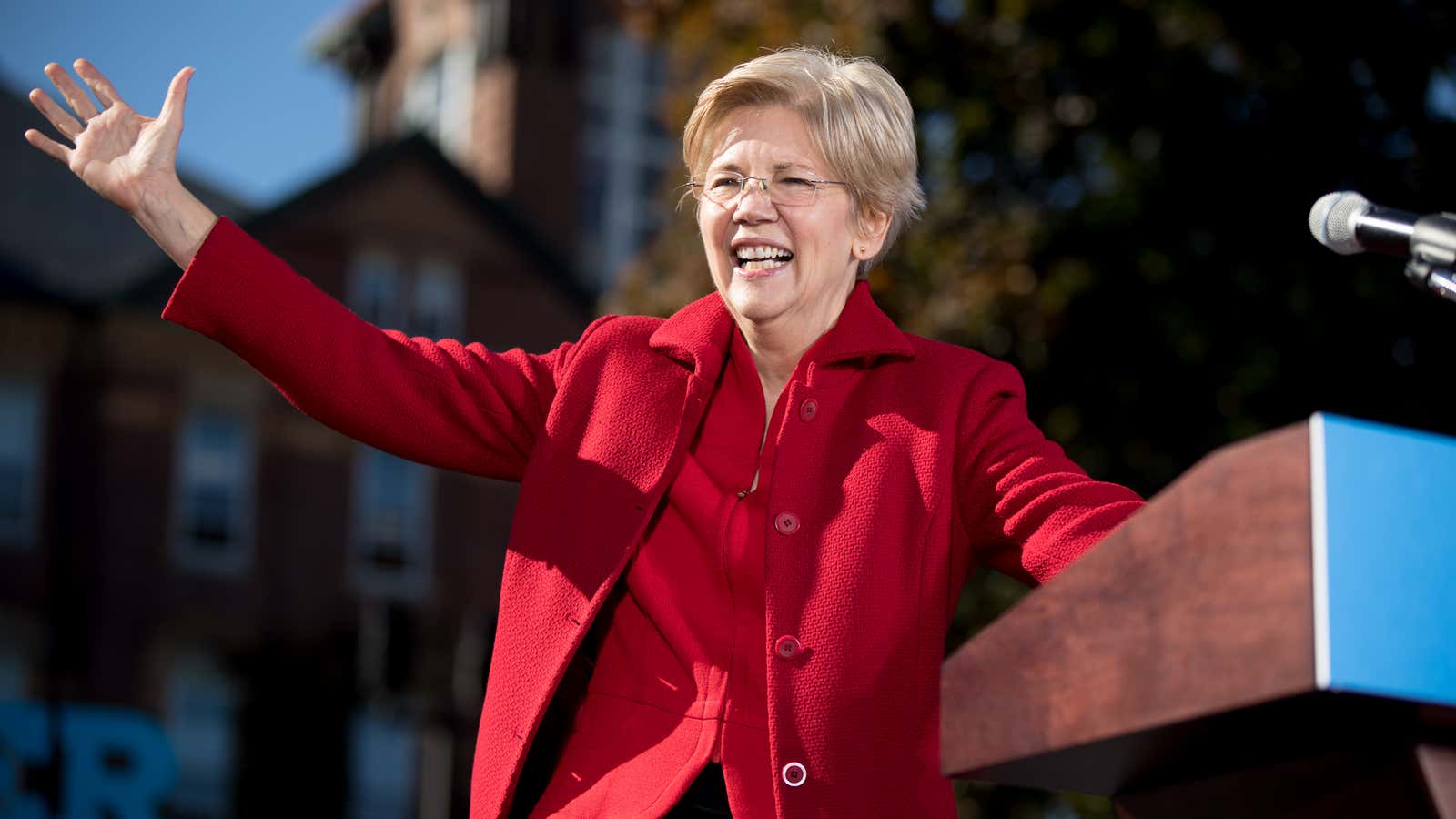In 2010, big banks and congressional Republicans thought they’d succeeded in pushing Elizabeth Warren to the sidelines.
They had stopped the White House from nominating Warren, a Harvard law professor and consumer protection advocate, as the director of the newly founded Consumer Financial Protection Bureau. One Obama advisor helpfully suggested that she might serve as “cheerleader” to the agency—her own brainchild.
Six years later, it’s clear that her opponents celebrated too soon. Warren is now a senator whose influence expands well beyond Washington. Whether she’s stumping with presidential contender Hillary Clinton or zigzagging across the country in support of her colleagues, the Massachusetts Democrat is on fleek and in high demand. Murshed Zaheed, political director of the progressive group CREDO, calls her one of the party’s “absolute bona fide rock stars.” And whatever the results of the election on Nov. 8, Warren’s influence over financial reform and the future of American politics is sure to grow—whether she’s protecting the Dodd-Frank Act or fighting “too big to fail” banks.
If Hillary Clinton is elected president, Warren’s staff has signaled they will try to prevent the White House from filling key positions with Wall Street insiders. With Congress expected to remain hamstrung with dysfunction, Warren and her backers see executive appointments as the last, best option for getting policy made to help those struggling before the middle class is wiped out entirely. For them, the task is urgent. Thanks to Warren, “personnel is policy” is the new Washington mantra on the left.
One Clinton camp email from January 2015, made public courtesy of WikiLeaks, describes an illustrative meeting between a Clinton official and Warren’s longtime staffer, Dan Geldon. The email discusses Warren’s feelings on potential nominees and concerns with certain Obama picks. “We then carefully went through a list of people they do like, which EW sent over to HRC earlier,” a Clinton aide reported in the note. Earlier this fall, press reports suggested that Warren’s allies had started building a so-called “hell no” appointments list—people with close banking industry ties whom they’d vigorously fight.
Warren already has a strong track record on the issue. Her team previously torpedoed the nomination of investment banker Antonio Weiss to a top role within the Treasury Department. (He now serves as a counselor to Treasury secretary Jack Lew, a position that doesn’t require Senate approval.) And while Warren’s withering takedown of John Stumpf, the Wells Fargo CEO, wasn’t the sole reason for his ouster in the wake of the bank’s fake accounts scandal, it likely helped shift public opinion against him.
Warren’s latest target is Mary Jo White of the Securities and Exchange Commission, whom Warren has criticized for not developing a rule that would require public corporations to disclose their political spending, among other issues. It remains to be seen how long White will last as chair of the agency under the senator’s continued scrutiny.
Should Democrats take control of the Senate this week, Warren will also have a key ally in senator Sherrod Brown of Ohio, who would likely take over as chairman of the Senate Banking Committee. He currently serves as the panel’s ranking member. Together, Brown and Warren would be expected to provide a staunch defense of the CFPB and explore ways to rein in the country’s largest banks.
“Sen. Warren has an incredibly close, and I would say professionally beneficial relationship, with Sen. Brown,” said Isaac Boltansky, a policy analyst with Compass Point Research & Trading.
Even if Brown’s legislative efforts were stymied by the House, which is expected to remain in Republican hands, he would be able to set the committee’s agenda, hearing schedule, and potentially help Warren nab her own subcommittee chair. It’s in those wonky, often dry hearings that Warren records many of the viral soundbites that circulate widely across the web, firing up progressives. While she’s known as a Wall Street crusader, Warren also frequently grilled regulators for failing to prosecute banks for illegal activities and other supervision shortfalls.
Some Warren supporters may wish that the Massachusetts senator herself would take the committee’s gavel. But over the past four years, Warren has shown that her influence lies outside of standard Senate processes. Her strong following is instead attributable to her ability to make complex debates around economics and finance accessible to the public.
This is true whether she’s talking about bringing back a law to separate commercial and investment banking activities or about the need to better track old retirement accounts; whether she’s fighting against the rollback of an obscure Dodd-Frank derivatives provision or pushing for fundamental reforms to how student loans are serviced.
“These are complicated, esoteric issues and one of her great gifts is her ability to really explain things,” Boltansky said. “There is no one who makes the issues more accessible and therefore more actionable than Sen. Warren.”
Warren would also be a formidable opponent in the event of a Donald Trump victory. Should Trump secure his bid for the White House and Republicans hold on to both chambers of Congress, Warren’s voice would still provide a significant counterweight for her party.
“Senators like Elizabeth Warren and Bernie Sanders are going to be the ones who can provide the moral clarity that Democrats would need on the issues” if there’s a GOP blowout, according to Zaheed. Her ability to clarify difficult issues and command a broad audience would help ensure that Democratic messages don’t get buried by Republican leadership, keeping up party morale and cementing her role as a spokesperson on progressive issues.
And so, whether Tuesday’s election results favor Democrats or Republicans, Warren will continue building her legacy. Much as critics wanted to relegate Warren to the role of cheerleader, the senator keeps dominating the field.
